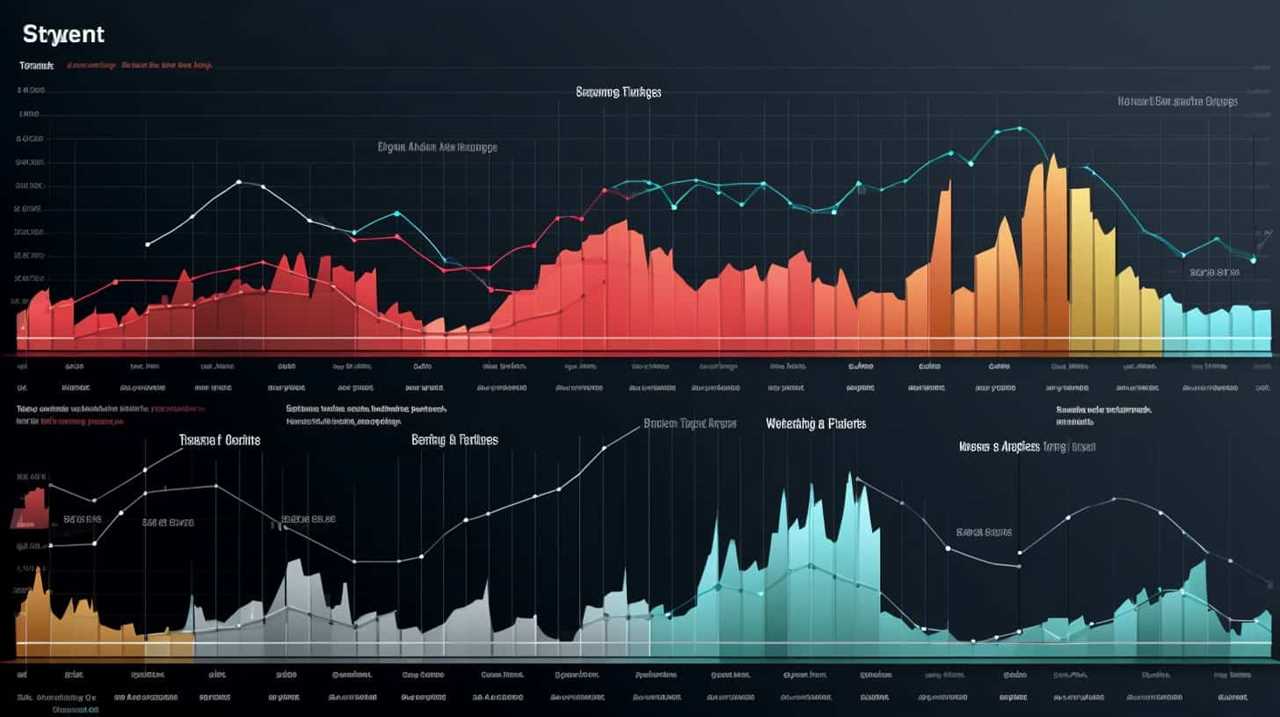Tired of searching for the perfect keyword research tool? Look no further! We’ve put together a list of the top free keyword research tools especially for you.
These tools are like a treasure chest, packed with valuable insights to help you dominate the SEO game. In this article, we’ll show you how to effectively use these tools, understand keyword metrics, find long-tail keywords, analyze competitor keywords, and share best practices.
Get ready to master keyword research without spending a dime!
Key Takeaways
- Free keyword research tools help find long-tail keywords for niche audiences and relevant traffic.
- These tools provide valuable insights on keyword search volume, competition, and trends.
- Using free tools can save money compared to paid ones while improving SEO efforts.
- Effective use of free keyword research tools involves understanding their functionalities and regularly updating keyword strategies.
Benefits of Using Free Keyword Research Tools
Using free keyword research tools offers numerous advantages for our team.

One of the key benefits is the ability to find long tail keywords. These longer, more specific phrases can help us target a niche audience and attract highly relevant traffic to our website.
Free keyword research tools also allow us to gather valuable insights about keyword search volume, competition, and trends. This information helps us make informed decisions about our content strategy and optimize our website for better visibility in search engine results.
Additionally, utilizing free keyword research tools saves us money that would otherwise be spent on paid tools. With these free tools, we can still achieve effective keyword research and improve our search engine optimization efforts.
Top Free Keyword Research Tools for SEO
We have found several excellent free keyword research tools for SEO that can greatly benefit our team in optimizing our website. By using these tools, we can uncover high volume keywords that will help drive more traffic to our site and improve our search engine rankings. Here are some of the top free keyword research tools that we recommend:

| Tool | Description |
|---|---|
| Google Keyword Planner | This tool provides keyword ideas and search volume data based on Google search queries. It also allows us to analyze keyword trends and competition. |
| Ubersuggest | Ubersuggest offers keyword suggestions, search volume data, and keyword difficulty scores. It also provides insights into top-ranking pages and backlink data. |
| AnswerThePublic | This tool generates questions and phrases related to our keyword, helping us understand what our target audience is searching for. |
How to Use Free Keyword Research Tools Effectively
To effectively utilize these free keyword research tools, it’s essential to understand their functionalities and incorporate them into our content creation strategies.
Utilizing free keyword research tools for content optimization is a crucial step in improving our website’s visibility and driving organic traffic growth. These tools allow us to identify relevant keywords with high search volumes and low competition, giving us insights into what our target audience is searching for.
By integrating these keywords into our content, we can optimize our website for search engines and increase our chances of ranking higher in search results.
Additionally, maximizing the potential of free keyword research tools for organic traffic growth involves regularly analyzing and updating our keyword strategy to stay ahead of the competition.

With the right approach, these tools can be powerful allies in our quest for online success.
Understanding Keyword Metrics in Free Tools
To gain a deeper understanding of keyword metrics in free tools, we can delve into their data and analyze the insights they provide for optimizing our content.
One important metric to consider is keyword competition. This metric tells us how difficult it’s to rank for a particular keyword. It helps us identify keywords that have low competition, making it easier for our content to rank higher in search engine results.
Another crucial metric is search volume. This metric indicates how many times a keyword is searched for in a given period. By focusing on keywords with high search volume, we can target a larger audience and potentially drive more traffic to our website.

Understanding these keyword metrics allows us to make informed decisions when selecting keywords for our content.
Tips for Finding Long-Tail Keywords With Free Tools
When it comes to keyword research, long-tail keywords are crucial for targeting specific search queries and driving organic traffic to your website. Thankfully, there are several free tools available that can help you find these valuable keywords.
In this section, we’ll explore the importance of long-tail keywords, highlight some of the best free tools for keyword research, and provide tips for conducting effective research to uncover high-performing long-tail keywords.
Importance of Long-Tail Keywords
Our team understands the importance of long-tail keywords and has found several effective strategies for finding them using free tools.

Here are four strategies that can help you identify profitable long-tail keywords for content optimization:
- Use keyword research tools: Free tools like Google Keyword Planner, Ubersuggest, and Answer the Public can provide valuable insights into long-tail keywords that are relevant to your niche. These tools can help you discover what people are searching for and generate new keyword ideas.
- Analyze your competitors: Look at the keywords your competitors are targeting and identify any long-tail keywords they may have missed. This can give you a competitive advantage and help you find untapped opportunities.
- Leverage customer feedback: Pay attention to the questions and comments from your customers. These can be a goldmine for long-tail keyword ideas. Use tools like Quora, Reddit, and social media platforms to gather insights and discover what people are talking about in your industry.
- Monitor trends and industry news: Stay updated with the latest trends and developments in your industry. This can help you identify emerging long-tail keywords that have the potential to attract a high volume of targeted traffic.
Best Free Tools
We frequently utilize free tools to find the best options for uncovering long-tail keywords and optimizing our content. When it comes to finding long-tail keywords, there are several free tools that can help.
One of the most popular tools is Google Keyword Planner. This tool allows you to enter a keyword and find related keywords along with their search volume and competition level.
Another useful free tool is Ubersuggest. It provides keyword suggestions and data on search volume, competition, and CPC.

Additionally, Answer the Public is a great tool for finding long-tail keywords based on common questions people ask.
Tips for Effective Research
To effectively research long-tail keywords using free tools, we can continue exploring the best options discussed in the previous subtopic. Here are some tips for organizing your research and strategies for using keyword research tools:
- Utilize keyword suggestion tools: These tools generate a list of related keywords based on a seed keyword, helping you discover long-tail keyword opportunities.
- Analyze competitor keywords: Identify your competitors and analyze the keywords they’re ranking for. This can give you insights into potential long-tail keywords that you may have overlooked.
- Use question-based searches: Long-tail keywords often include question phrases. By searching for questions related to your niche, you can uncover valuable long-tail keyword ideas.
- Leverage Google Autocomplete: As you type in a search query on Google, it suggests popular search phrases. These suggestions can provide you with long-tail keyword ideas.
Free Tools for Competitor Keyword Analysis
For competitor keyword analysis, one effective tool is the Google Keyword Planner. This free tool allows you to research keywords by providing search volume data and keyword ideas. By using the Google Keyword Planner, you can gain insights into the search volume of specific keywords and identify potential opportunities for your website or content.
Another free tool for competitor keyword analysis is SEMrush. With SEMrush, you can analyze your competitors’ organic and paid keywords, discover new keyword opportunities, and compare your website’s keyword performance with your competitors’.

These free tools for search volume analysis and techniques for competitor keyword analysis provide valuable insights that can help you strategize and optimize your content to stay ahead of the competition.
Now, let’s dive into the best practices for using free keyword research tools.
Best Practices for Using Free Keyword Research Tools
When using free keyword research tools, it’s important to follow best practices for optimal results. Here are four key tips to keep in mind:
- Understand the benefits of long tail keywords:
Long tail keywords are longer, more specific phrases that target a niche audience. They may have lower search volumes but higher conversion rates. By using long tail keywords, you can attract more qualified traffic to your website. - Conduct thorough research:
To find high volume keywords, utilize free keyword research tools to explore popular search terms related to your niche. Look for keywords with high search volumes and low competition to maximize your chances of ranking well in search engine results. - Analyze your competitors:
Study your competitors’ websites to identify the keywords they’re targeting. This can help you discover new keyword opportunities and improve your own keyword strategy. - Continuously monitor and refine your keyword strategy:
Keyword research is an ongoing process. Regularly analyze your website’s performance, keep an eye on trending keywords, and make adjustments to your strategy as needed.
Frequently Asked Questions
Are Free Keyword Research Tools as Effective as Paid Ones?
Free keyword research tools have their pros and cons. While they can provide valuable insights, paid tools often offer more advanced features and comprehensive data. Case studies show that paid tools tend to be more effective in driving targeted traffic and optimizing SEO strategies.

Can I Use Multiple Free Keyword Research Tools Simultaneously?
Yes, we can use multiple free keyword research tools simultaneously. While there may be limitations, it can provide a wider range of insights and help identify keyword trends. However, be mindful of the potential overlap and prioritize quality over quantity.
How Often Should I Update My Keyword Research Using Free Tools?
We update our keyword research using free tools regularly to stay on top of trends and identify long tail keywords. Competitor analysis is crucial in this process to understand what keywords they are targeting.
Do Free Keyword Research Tools Provide Accurate Search Volume Data?
Yes, free keyword research tools can provide accurate search volume data, but it’s always wise to verify with alternative sources. Some alternatives to free tools include paid keyword research tools and data from search engine advertising platforms.
Are There Any Limitations or Restrictions When Using Free Keyword Research Tools?
There are limitations to using free keyword research tools. They may not provide comprehensive data or accurate search volume. However, there are alternatives to free tools that offer more advanced features and reliable information.

Conclusion
In conclusion, by utilizing free keyword research tools, we can unlock a world of opportunities for our SEO strategy. These tools offer numerous benefits, from understanding keyword metrics to finding long-tail keywords and analyzing competitor keywords.
By effectively using these tools, we can optimize our website’s visibility and drive targeted traffic. So, let’s harness the power of these free tools and unlock the potential of our online presence.
It’s time to pave the way for success in the digital landscape.










